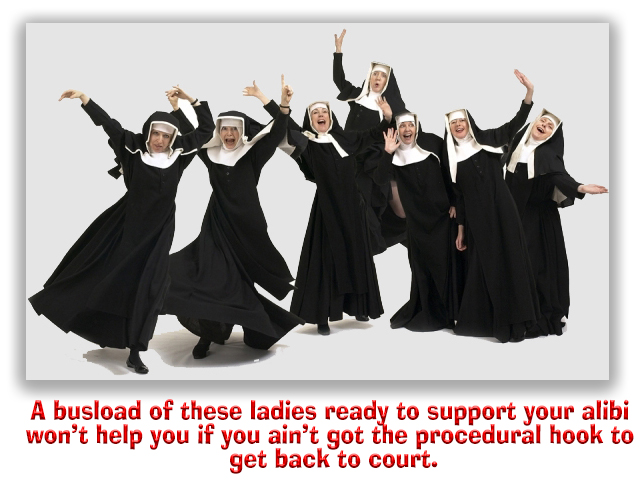We post news and comment on federal criminal justice issues, focused primarily on trial and post-conviction matters, legislative initiatives, and sentencing issues.

JUST BECAUSE A 2255 WON’T WORK DOESN’T MEAN A 2241 WILL
A military aphorism credited to more than one general (the oldest of whom was General Omar Bradley) is “amateurs talk strategy, but professionals talk logistics.” A post-conviction adjunct might be, “clients talk substantive issues, but lawyers talk procedure.”
 What we mean is in post-conviction proceedings on federal convictions, the best case on the planet (imagine a newly-discovered busload of nuns who all swear they saw you helping your mother weed her garden 50 miles from the back that was being robbed at the same time) does not help you if you have no procedural course for getting back into court. And the procedural snares of 28 USC § 2255 are many and varied.
What we mean is in post-conviction proceedings on federal convictions, the best case on the planet (imagine a newly-discovered busload of nuns who all swear they saw you helping your mother weed her garden 50 miles from the back that was being robbed at the same time) does not help you if you have no procedural course for getting back into court. And the procedural snares of 28 USC § 2255 are many and varied.
Lee Farkas was charged with various white-collar fraud offenses, and the government got court permission to freeze all of his considerable assets before trial. The purported reason is to be sure there is enough money to pay criminal forfeiture and restitution if the government wins, but the real reason, of course, is that it hamstrings the defendant, making it impossible to afford a defense that might level the playing field with the U.S. Attorney’s Office.
And it worked (for awhile). Lee had a lot of trouble affording the lawyers he needed. The result showed it: Lee was convicted, and got 360 months in prison.
A few years later, after Lee had filed and lost a 28 USC § 2255 motion, the Supreme Court ruled in Luis v. United States that freezing all of a defendant’s innocent assets violated the 6th Amendment. Based on that decision, the 4th Circuit ruled that criminal forfeiture statutes could not reach assets that might be substituted for forfeitable assets if the defendant lost.
Based on these decisions, Lee filed a 28 USC § 2241 petition for habeas corpus, arguing that under the 28 USC § 2255(e) savings clause, he could use the § 2241 to demand a new trial, because the seizure had violated the 6th Amendment and statute. Last week, the 4th Circuit shot him down.

The Circuit followed its three-part test defining the “limited circumstances” under which § 2255 will be “inadequate to test the legality of the prisoner’s detention.” First, at the time of conviction, the settled law of the Circuit or the Supreme Court must have established the conviction’s legality. Second, after the prisoner’s direct appeal and previous § 2255 motion, the substantive law must have changed so that the conduct of which the prisoner was convicted is no longer criminal or the sentence is illegally extended. And third, the prisoner cannot satisfy the gatekeeping provisions of § 2255(h) because the new rule is not one of constitutional law.
The 4th said a constitutional issue can never be heard on a § 2241 motion, because a § 2255 motion is intended for adjudicating such claims. What’s more, Lee was not claiming that he was actually innocent of the offense or sentence, but rather that taking his money was a fundamental defect in the proceeding. That is not good enough for a § 2241, the Circuit said.
Farkas v. Warden, Case No. 19-6347, 2020 U.S. App. LEXIS 27233 (4th Cir. Aug. 26, 2020)
– Thomas L. Root

